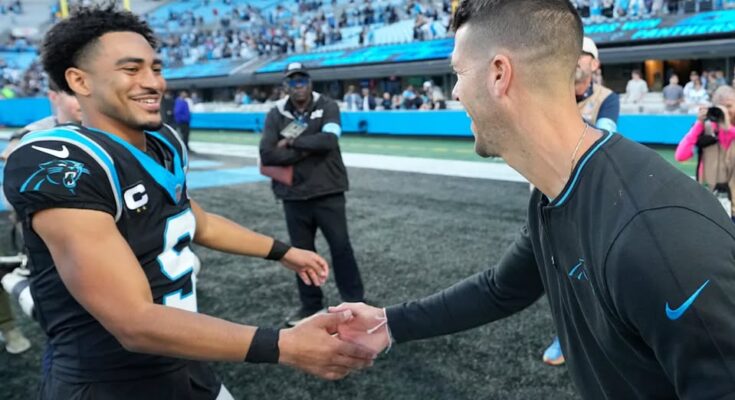Bryce Young should lead the Panthers’ attack, according to head coach Dave Canales, and the reasoning behind that vote of confidence stretches beyond just a coach’s standard support for his quarterback. It’s rooted in a blend of belief in Young’s talent, recognition of his developmental potential, and a strategic commitment to long-term success in Carolina. Despite a challenging rookie campaign, the Panthers remain steadfast in their approach to make Bryce Young the centerpiece of their offensive scheme. This decision is not merely symbolic; it reflects a larger philosophical shift under Canales’ leadership — one that prioritizes patience, structure, and quarterback-centric offense.
Bryce Young entered the NFL as the first overall pick in the 2023 Draft, surrounded by high expectations. His collegiate career at Alabama showcased a rare blend of poise, accuracy, and football IQ. Young wasn’t just a dynamic passer; he was a leader who lifted his team in crucial moments. Those qualities don’t vanish in the face of adversity. Canales understands that and is positioning himself to help his quarterback grow through the NFL’s steep learning curve rather than abandon the plan at the first sign of struggle.
Young’s rookie season was rough by many metrics. He dealt with a weak offensive line, inconsistent play calling, and a lack of reliable weapons at the skill positions. These limitations would be difficult for any rookie to overcome, especially one operating under a revolving door of coaching instability. Carolina’s offense finished near the bottom of the league in scoring and total yards. Young threw more interceptions than touchdowns and rarely had a clean pocket to operate from. Yet, despite these struggles, there were flashes — moments when his decision-making and anticipation resembled the prospect that had NFL scouts raving.
This is where Dave Canales comes in. Known for his work with quarterbacks, Canales has built a reputation as a QB developer. His recent success with Geno Smith in Seattle and then helping Baker Mayfield reclaim his career in Tampa Bay has not gone unnoticed. In both cases, Canales simplified the offense, tailored it to the quarterback’s strengths, and built a culture that allowed for growth without immediate perfection. That track record is particularly relevant now as he takes the reins in Carolina.
By publicly backing Young, Canales is signaling that this isn’t a competition or a short-term experiment. This is a developmental project with a franchise-altering ceiling. He’s betting on Young’s mental toughness, intelligence, and leadership — qualities that don’t show up on a stat sheet but are invaluable in a rebuilding team. And that message resonates not only with Young but also with the rest of the locker room. When a coach is clear about his vision and backs it up with consistent support, it lays the foundation for accountability and cohesion.
Moreover, Canales isn’t just giving Young the keys without a plan. The Panthers have made several offseason moves aimed at giving Young the tools he needs to succeed. They’ve bolstered the offensive line, added depth at receiver, and made a point of building a more robust running game — all hallmarks of an offense that doesn’t put the entire burden on the quarterback’s shoulders. This ecosystem is essential for a young QB to thrive. Surrounding him with competent protection and playmakers gives him the opportunity to progress rather than regress under pressure.
At the core of Canales’ decision is a belief in process over results. The NFL is a results-driven league, but the teams that sustain success understand the importance of long-term development. Benching Young or putting him in a quarterback competition after just one season would send the wrong message — not only to him, but to the team as a whole. It would imply panic, indecision, and lack of direction. Instead, Canales is planting his flag early. He’s saying: this is our guy, and we’re going to grow with him.
Young, for his part, has responded with the professionalism that made him so attractive as a prospect. Throughout the offseason and OTAs, reports have pointed to his renewed confidence, his grasp of the new offensive system, and his commitment to refining his mechanics and timing. He’s reportedly taken ownership of the huddle, speaking with more command, engaging more proactively with teammates, and embracing the leadership role. These are signs that he’s turning the page from his rookie year and preparing to take on more responsibility.
The offensive system Canales brings should help. It’s a West Coast-based scheme with a heavy emphasis on timing, rhythm, and high-percentage throws. It’s designed to simplify reads, get the ball out quickly, and protect the quarterback. This suits Young’s skill set. At Alabama, he thrived in a system that emphasized quick decisions and capitalized on his anticipation. By incorporating similar principles, Canales is doing what all good coaches do — adapting the scheme to fit the player, not the other way around.
Another significant factor is the psychological aspect of quarterback play. Confidence matters. For a young quarterback, knowing that the coaching staff believes in you can be the difference between progress and regression. When a coach publicly declares that you are the guy, it provides clarity. Young now knows where he stands and what’s expected of him. That security allows him to focus on the work rather than worry about politics or second-guessing. It enables growth.
This isn’t to say there won’t be more bumps along the road. There will be growing pains, especially in a division that features experienced defenses and aggressive coordinators. Young will face adversity again. But now, the infrastructure is different. He has a head coach who understands quarterback development. He has a system that plays to his strengths. He has an organization that is showing patience. These are the ingredients that can turn a rough rookie start into a successful sophomore leap.



